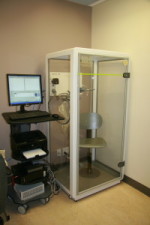We operate with a hospital grade pulmonary function ‘Body Box’. The Body Box is a very sensitive tool for measuring the output of your lungs. It is an airtight chamber that contains measuring equipment. As a patient, you sit in the chamber and complete different breathing techniques into the equipment. Body plethysmography is the most rapid and accurate method of measuring absolute lung volume.
In addition to the pulmonary function tests that we have been doing, we can now also do Airways Resistance testing at the Albany Medical Clinic. No need to book an appointment at a hospital.
Book your appointment now!
Hours:
Monday to Friday
8:30 AM to 4:30 PM
Saturdays: Closed
Holidays: Closed
Appointments are required. (8 years old and up)
Tel: (416) 461-9471 x2320
Services
A pulmonary function test is a series of tests that measure lung function. The tests provide information about the amount of air a person’s lungs can hold, and how effectively the lungs work. They also look at the forcefulness of an individual’s breathing.
A pulmonary function test may be done when a person has shortness of breath, or difficulty breathing. The test can be used to diagnose respiratory conditions, including the following:
- abnormal blood flow to the lungs, such as pulmonary hypertension
- chronic obstructive pulmonary disease, including chronic bronchitis and emphysema
- reactive airway disease, such as asthma
- other respiratory diseases, such as cystic fibrosis.
Once a respiratory problem has been diagnosed, pulmonary function tests can be used to monitor response to treatment.
We conduct the following pulmonary function tests at our lab using our new Body Box:
- Spirometry identifies patients who might have obstructive or restrictive lung disease, but also helps the physician objectively determine the severity of the diseases and provides a benchmark for future comparison should the patient show either improvement or deterioration.
- Lung volume determination is used to measure the total volume of the lung in the chest (termed the total lung capacity). Lung capacity analysis can indicate pulmonary restriction (small lung size) either from scarring of the lung tissue, extrinsic compression of the lung by fluid or chest/abdominal wall abnormalities, or weakness of the diaphragms. A high total lung capacity usually indicates “trapping” of air in the lungs by obstructive lung diseases such as asthma, chronic bronchitis, emphysema or COPD.
- Lung diffusion capacity determination essentially measures how well the lungs are working in their basic function – that is, transferring gas between the air and the blood stream.
- Airways Resistance testing is a very sensitive test to determine the early stages of COPD. As a patient, you will sit inside the BodyBox and perform various breathing exercises. From the testing, the physician receives data on which will help to diagnose pulmonary diseases such as COPD, asthma or fibrosis.
We are also able to perform the ‘rest and 6 min walking test’ for oximetry reading.
Patient Preparation
What you need to do before your appointment:
- No caffeine for 2 hours prior to the test.
- If you smoke, don’t smoke for about 12 hours before the test.
- Wear loose clothing so that you may breath comfortably.
- Do not eat a big meal before the test.
- Do not take inhalers or lung medicines for the following times:
- short-acting inhaled or oral
- bronchodilators (salbutamol) – 8 hours
- long-acting inhaled or oral bronchodilators (SereVent) – 24 hours
- twice a day theophylline (Slobid) – 24 hours
- once-daily theophylline.
- Bring any documentation your family doctor gave you including the referral requisition.
- Bring your provincial health card.
Reschedule the test if you are coming down with a cold or the flu.
Languages
English

